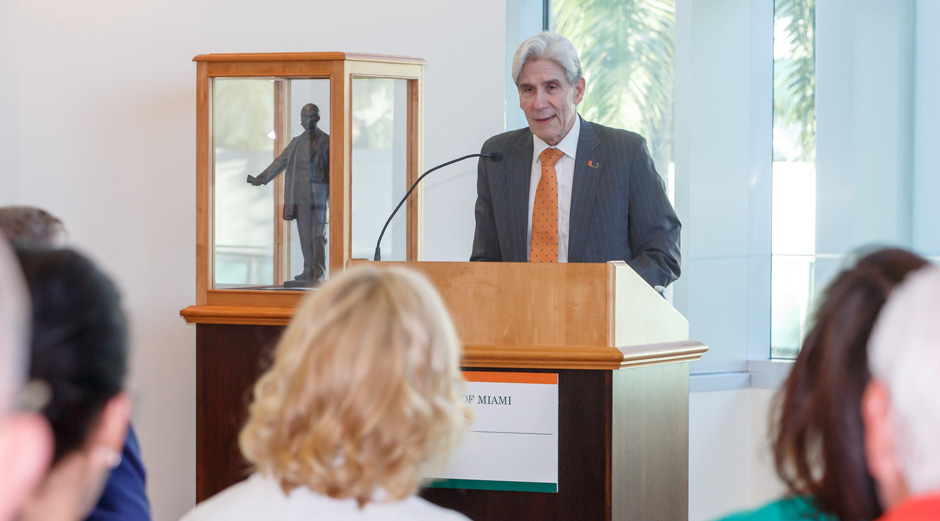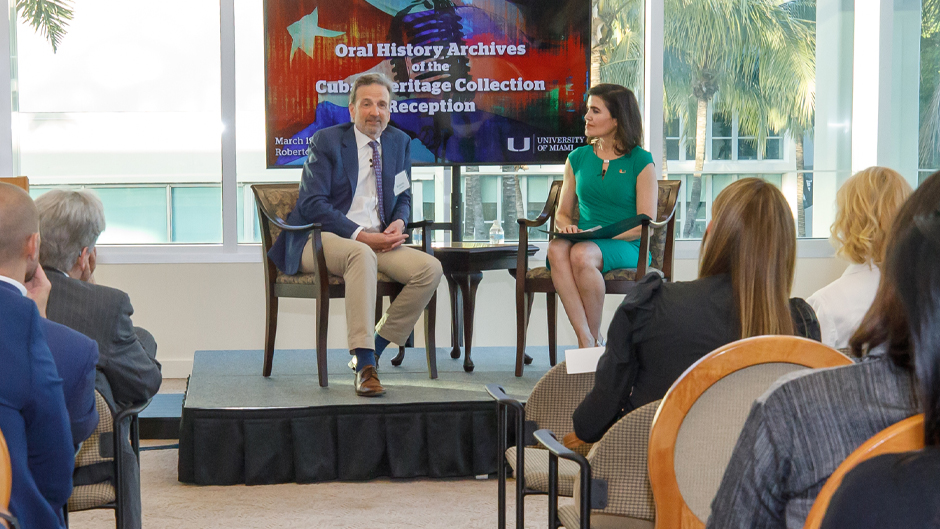At the age of 6, his family fled Cuba. His father never looked back, while his mother worked hard to preserve the family’s Cuban heritage and culture.
So explained Roberto S. Goizueta, professor emeritus of theology at Boston College and director of The Goizueta Foundation, during a live oral history session and reception on March 19 at the Roberto C. Goizueta Pavilion at the Otto G. Richter Library to mark the expansion of the University of Miami Cuban Heritage Collection’s (CHC) oral history archives.
In a conversation moderated by Ana VeigaMilton, University trustee and member of the Libraries’ Dean’s Advisory Committee, Goizueta recounted heartfelt stories about his family’s journey as part of the Cuban and Cuban American experience.
His captivating anecdotes included how his brother Javier’s impending birth—during the Cuban revolution—resulted in his mother being rushed to the hospital in a military jeep, flying a white flag emblazoned with a red cross hand embroidered by his great-grandmother.
Goizueta noted that upon immigrating to the United States, the family lived in Miami and Nassau for several years before settling in Atlanta when his father was named vice president of The Coca-Cola Company. At the same time, his mother “always insisted on speaking only Spanish in the home. We were not allowed to speak English, and if we did, she would insist we write, in Spanish, ‘I am not allowed to speak English in the house’ over and over again.
“Some of my happiest memories are when she used to play the guitar and sing Cuban songs and ballads,” Goizueta said. “After dinner, we would all gather around the living room, and she would be on the guitar, singing, with three kids and my father. I was the rhythm section. That was a cherished memory and one I still hold dear.”
Goizueta’s father, Roberto Críspulo Goizueta, described by his son as a man who believed there were no obstacles, only opportunities, rose through the ranks at Coca-Cola, becoming president and then chairman and chief executive officer—positions he held for 16 years until his death in 1997. His mother, Olga Goizueta, held several leadership positions with Atlanta-based community organizations and was trustee and chair of The Goizueta Foundation.
Goizueta’s recollections underscored the resilience and determination of Cuban Americans to uphold their heritage despite geographical and cultural barriers while simultaneously feeling deep gratitude to the country that took them in.
That spirit is at the heart of the University’s commitment to preserving Cuba’s cultural heritage, explained Charles Eckman, dean and University librarian. During his remarks, Eckman highlighted the University’s collaboration with Cuban librarians and the exile community in building the collection, the largest repository of Cuban history outside the island.
University President Julio Frenk expressed gratitude to the AMIGOS of the Cuban Heritage Collection for their role in elevating the collection’s success and their support of the Luis J. Botifoll Oral History Project, which features interviews with nearly 120 community leaders, including influential Cuban American philanthropists and entrepreneurs Mike Fernandez, Carlos Quintela, and Maria C. Alonso; Brothers to the Rescue founder José Basulto; and photographer Asela Torres, who were all in attendance.

“Oral histories play a powerful role in not only transmitting community memory, but enriching research and the often-incomplete written historical record. Too many Cuban stories remain untold,” said Frenk, underscoring the importance of oral histories in preserving a community’s cultural legacy.
Since 2008, the CHC has diligently documented the rich tapestry of South Florida’s exile community by recording oral histories. While the project's scope has been primarily focused on prominent Cuban Americans, last week’s event aimed to ignite enthusiasm and support for the CHC’s plan to broaden its collection to include histories of individuals from all walks of life.
“We hope to highlight the importance of recording our diverse personal, familial, and shared stories as a community before it is too late,” VeigaMilton said.
The Goizueta Foundation has supported the CHC since its inception with grants and bequests that facilitated the construction of the Roberto C. Goizueta Pavilion and established endowments for various initiatives, including graduate student fellowships, acquisitions, research, and leadership positions, ensuring the continuation of the CHC’s vital work.
Amanda Moreno, Esperanza Bravo de Varona Chair and director of the Cuban Heritage Collection, spoke about the significance of preserving the diaspora’s legacy, emphasizing the need to capture the stories of various generations and backgrounds.
“The preservation of our heritage hinges on our ability to document diverse experiences. To achieve this, we’re committed to expanding sustainability and acquiring diverse collections to meet the needs of students, scholars, and the local community, ensuring accessibility to all,” Moreno said.
Echoing that sentiment was Michael Bustamante, associate professor of history, Emilio Bacardí Moreau Chair in Cuban and Cuban American Studies, and director of academic programs at the collection.
“We ask you to join us in making our oral history program permanent and expansive, led by dedicated faculty and staff, supported by student involvement, and committed to creating a more complete record of the Cuban diaspora experience, in all of its richness and diversity,” Bustamante said.

